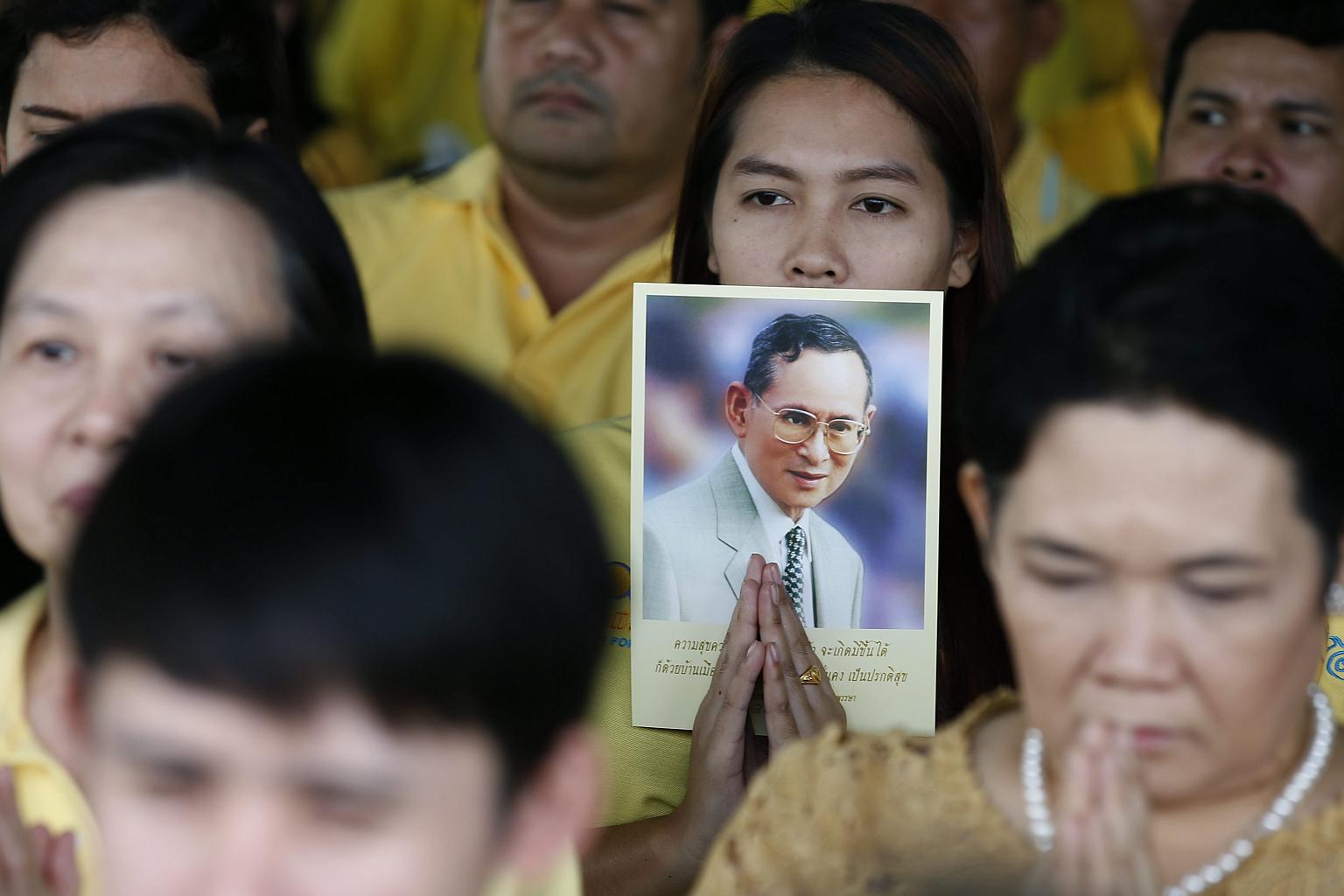King Bhumibol Adulyadej: An accomplished musician and composer
Sign up now: Get insights on Asia's fast-moving developments

Thai people holding pictures of Thai King Bhumibol Adulyadej as they pray on June 9, 2016, during the celebrations of the monarch's 70th anniversary of accession to the throne.
PHOTO: EPA
BANGKOK - An accomplished jazz musician and composer, Thailand's King Bhumibol Adulyadej had played his saxophone alongside legends like Benny Goodman, Stan Getz, Lionel Hampton and Benny Carter.
Internationally, his compositions had been featured by world-class orchestras at concerts worldwide, such as the Madrid Classical Orchestra of Spain, NHK Band of Japan, and Broadway theatres in the United States.
His sister, Princess Galyani Vadhana, said he developed an interest in music at the same time as his elder brother, King Ananda Mahidol, after the two heard her playing the piano, according to a biography on the website of Thailand's Public Relations Department (PRD).
While Princess Galyani Vadhana writes in her book "Little Princes - Young Kings" that their initial interest in musical instruments was brief, it was rekindled after they attended a concert in Arosa, Switzerland.
They soon bought a second-hand saxophone for 300 Swiss francs, but when the time came for lessons, the elder brother backed out and instead pushed his sibling into the room, which was how King Bhumibol had his first saxophone lesson.
In the early stages of his music education, the king concentrated on classical music for about two years, opting for wind instruments like the saxophone and clarinet. He later switched to jazz music, which gave him more freedom for improvisation. He would play his saxophone alongside recordings of famous jazz bands, jamming along with the tracks when he had acquired greater confidence and skills, says the biography.
The long hours of practice and his keen interest in music enabled the king to master the soprano saxophone, and he went on to play other woodwind instruments like the tenor saxophone, baritone saxophone, clarinet and trumpet.
The king wrote a total of 78 songs over a period of five decades. According to the website of the Royal Thai embassy in Singapore, his early compositions were mostly in the "blues" style, using the chromatic musical scale. He developed complex chords and rhythms which made possible varied arrangements for orchestral presentation.
His first-ever song was a melody entitled "Candlelight Blues," which he composed in April 1946. However, feeling that it needed to be more polished, he released another track that he composed in the same month - "Love at Sundown".
His third number was "Falling Rain", a waltz that is still popular with Thai listeners today.
He composed one more number before his accession, titled "Near Dawn."
Even after he was crowned, King Bhumibol continued to produce a steady stream of compositions, with tracks such as "Blue Day", "Dream of Love, Dream of You", and "Love Light in My Heart".
At the age of 32, he was awarded an honorary membership by the Vienna Academy of Music and Dramatic Arts in 1964. He was the first Asian composer to be accorded this honour.
During his musical career, King Bhumibol played with a number of international and Thai musicians. He also had a regular band called Wong Lay Kram (The Vintage Band), which became his private ensemble. The band used to give a performance every Friday evening at Ambara Villa in Dusit Palace.
In 1952, the PRD gave King Bhumibol a 100-watt radio transmitter, which he used to set up his own Au Saw Radio Station at Ambara Villa, which began broadcasting entertainment, information and news programmes to the public. The Thai initials "Au Saw" stood for the location of the station, Ambara Sathan. Today, the radio station is located at the compound of Chitralada Royal Villa within Dusit Palace.
When the band members of Wong Lay Kram grew older, new members were brought in. The band was later renamed the Au Saw Friday Band by the King and gave live performances on the air every Friday. For regular programmes, King Bhumibol scheduled the music timetable and handpicked the records. Occasionally, listeners were allowed to make call-in requests to the band.
At the Sangkhitamongkhon (Golden Concert) on April 6, 1966, King Bhumibol explained the source of his inspiration that spurred him to write so many compositions.
"I have received the generous support of musicians, composers, and singers, including the general audience, who express unfailing appreciation and loyalty to my compositions. It's what keeps me going," he said at the time.
The king's compositions can often be heard at social gatherings and are performed in concerts even today.


